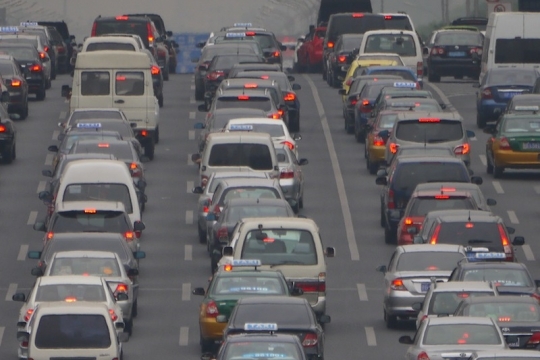A plan to reduce automobile traffic in Beijing was in the hands of the city’s mayor in late 2013. EfD China played a major role in figuring out what strategies would – and would not – be likely to reduce the pollution and congestion that Beijing residents have been facing as a result of economic growth.
“Traffic officials have been trying to figure out how to get cars off the road since the 2008 Beijing Olympics,” said Professor Jintao Xu, director of the EfD center (the Environmental Economics Program in China at Peking University.) “Our research has shown that restrictions such as odd-even license plates haven’t helped, and that charging a fee to cars that enter the city at peak times is more likely to reduce traffic.”
This market-based solution has been five years in the making. “In preparation for the 2008 Olympics, Beijing imposed rules barring cars from the central city, based on license plate number,” explained Dr. Ping Qin, deputy director of the center. These temporary restrictions were followed by similar rules that remained in place after the Olympics were over. Based on the last digit of the license plate number, each car was banned from central Beijing one day a week during peak hours. But pollution and congestion continued.
To find out why, EfD researchers turned to the annual Beijing Household Travel Survey, in which thousands of households agree to fill out a one-day travel diary and complete a survey about their travel choices. “Almost half of drivers admitted to breaking the license plate rules,” concluded Dr. Qin after she and her colleagues examined this data for 2010.
People covered plates, borrowed plates or cars on the days their license number was banned, or simply ignored the rules.
The problem lay in convincing Beijing transportation officials to take the politically unpopular step of charging a fee for driving at peak times. “The public does not want to pay to use public roads,” said EfD Research Associate Lanlan Wang, who conducted the research with Dr. Qin. “People think it’s more fair to have a rule that applies to everyone, regardless of ability to pay a fee.”
This perception of fairness has little to do with the form of government, and has not been borne out by research. Mexico City, for instance, tried driving restrictions, only to find that wealthier people bought a second car with a different license plate to get around the rules. (A consistent theme in EfD research in many countries is that the lowest income people are not hit hardest by increases in the cost of driving because they are less likely to own cars.)
“In 2008, I knew about the failure of driving restrictions in Mexico City,” Dr. Xu continued. “So I started talking to planners in the Beijing Transportation Authority, to warn of possible unintended consequences of the license plate rules.” This was the start of an ongoing relationship between EfD China and the Transportation Authority, include a conference and internships.
A massive gridlock incident in late 2010 emphasized that the license plate policy wasn’t controlling congestion. Influenced by this incident and by Dr. Xu’s recommendations, the Transportation Authority submitted a list of new traffic measures. Some of these have been adopted, including higher parking fees and higher penalties for breaking the license plate rules. Still under consideration is a congestion charge: a fee to drive into the city at peak times. “A market-based system such as a congestion fee is likely to reduce driving more effectively,” concluded Dr. Xu.
Of course, commuters need an alternative. Another EfD Research Associate, Lunyu Xie, has used travel diary data to show that Beijing commuters readily switched from driving to subways when new stations were built within easy walking distance of their homes. “According to current construction plans, all residents in urban Beijing will be within walking distance of one subway station by 2015,” said Dr. Xie, a professor at Renmin University in Beijing. “Taking into account the cost of local pollution, greenhouse gases, time wasted sitting in traffic, and accidents, diverting Beijing commuters from autos to public transit will save millions of dollars a day.”
